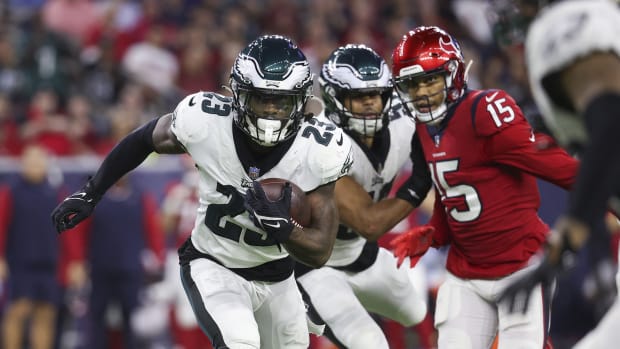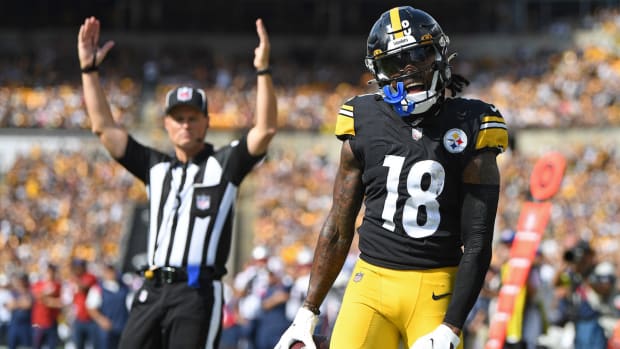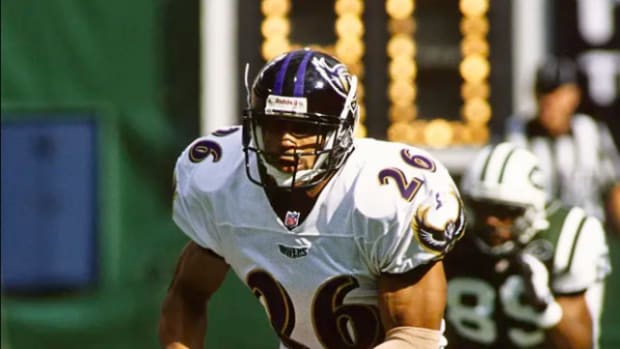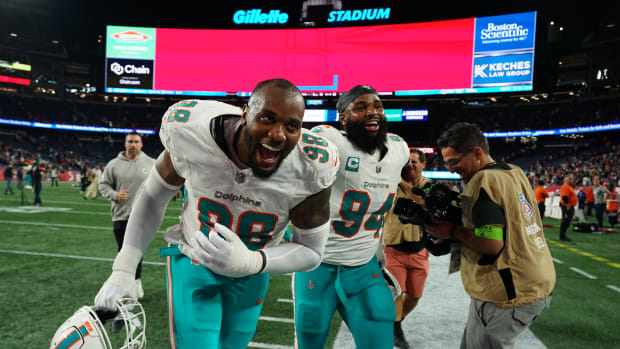The Financial Impact of Antonio Brown’s Movement
Antonio Brown has been on three teams in the last six months. The first two chose part ways with the wide receiver despite negative ramifications left in his wake. As for the third and present team, only time will tell. Let’s examine.
The Steelers traded Brown to the Raiders and incurred the largest non-roster (dead money) charge—$21 million—in the NFL this season. Along with whatever other nonroster cap charges Pittsburgh has heading into the season, they chose, by trading Brown, to play uphill this year, as his cap charge puts them at a financial disadvantage to their competitors. Of course, they knew this, and in weighing the pros and cons of keeping Brown or moving him, they chose the latter.
Enter the Raiders, who not only parted with a third- and a fifth-round pick but also gave Brown a new and upgraded contract (or so we thought). As it turned out, the only monies due prior to the season required Brown to participate in the Raiders’ offseason workout program—which Brown forfeited with his absence. As to Brown’s $29 million in future guarantees, the wide receiver voided the entirety of that money due to absences and potential “conduct detrimental” actions towards general manager Mike Mayock. That meant Oakland was able to move on from Brown with no cap or cash charges. They did not come out of the experience clean, however—the traded draft picks are gone for good.
A few days after Brown signed with the Patriots, he was accused of sexual assault by Britney Taylor, his former trainer. A long exclusive from The MMQB’s Robert Klemko detailed additional accusations of sexual misconduct from Brown. Brown has denied all accusations, but the fact that there have been no crimical charges does not necessarily make him immune from NFL discipline. Brown’s accuser, who filed a civil lawsuit, met with Roger Goodell on Monday, so now it’s up to the court of Goodell to determine if he should be disciplined.
Goodell has imposed severe discipline on players never charged with a crime, including, among others, Brown’s former teammate Ben Roethlisberger. And the commissioner exempt list, a “paid leave” feature the NFL dragged out of the cobwebs a few years ago to keep Adrian Peterson and Greg Hardy off the field, remains a possibility. As to this “paid leave” status, the NFLPA filed a grievance in 2016 challenging it, but lost. However, precedent has to count for something, and if players such as Ezekiel Elliott and Tyreek Hill were not placed on the exempt list prior to discipline (or no discipline), it seems unfair to Brown and the Patriots to place him on that list. But, of course, circumstances, and the gravity of the information that the commissioner hears, can change that.
As to Brown’s one-year deal with the Patriots (ignore the second-year phony option of $20 million for cap proration purposes), he has a $1 million salary, $500,000 in per-game roster bonuses and another $4.5 million in performance incentives for statistics greater than Brown’s performance last year. The most important feature of the deal, though, is a $9 million signing bonus with $5 million paid within two weeks of execution (Sept. 9) and $4 million on or before January 15, 2020.
The Patriots could be holding payment on the first installment of $5 million until the very last moment of the two-week window, which is Monday, Sept. 23. With Brown’s NFL status still murky, the Patriots may want to protect their rights. If Brown is suspended or facts come to light that would give the team pause—there was a report they wouldn’t have even signed Brown if they knew about this lawsuit (but they seem content keeping him now)—they could choose not to pay the bonus installment until things resolve. In that case, Brown would, and perhaps should, file a grievance to recover the money. Brown would appear to be entitled to that $5 million, and $4 million to come, simply for “signing” his contract. However, as we know, there will be lawyers and if things do go south, contract interpretation will be the key.
We have two forces at work with Brown and the Patriots, both with strong track records: 1. The best predictor of future behavior is past behavior; and 2. the Patriots get all players to fall in line. With Brown joining the team, one of these two adages will win out over the other.
Other wide receiver contract upgrades
Tyreek Hill
The Chiefs rewarded a player who, barely two months ago, many predicted would never play in the NFL again. Disturbing audio of Hill threatening his fiancée prompted a chorus of chants from many suggesting the Chiefs immediately sever ties. Yet the Chiefs waited, told Hill to stay away for a while, and waited for NFL discipline, which never came. Now Hill has not only is still a Chief, albeit injured, but has a new contract from the team, who benefited from the inevitably of the outrage waning. It always fades, especially on social media.
As to Hill’s contract, the Chiefs protected themselves with “only” a $5.8 million signing bonus and much more risk once 2020 arrives—a year removed from the release of the audio—with an $11 million roster bonus and $4.2 million of per-game roster bonuses. Despite the deferred risk, for a team that released Kareem Hunt on the day of a disturbing video to now reward a player after disturbing video is a curious allocation of their resources. But, of course, as I always say: greater talent means greater tolerance.
A final note on the Hill contract: Hill’s agent is Drew Rosenhaus, who found time in middle of the Brown tumult to negotiate this deal with the Chiefs. Kudos.
Julio Jones
Negotiations involve many factors, but none more important than leverage. The fact that Jones had two remaining years on his existing contract would usually be seen as a leverage negator. However, he and agent Jimmy Sexton used other circumstances to take advantage of extraordinary leverage with the Falcons.
The Falcons gave Jones a no-strings-attached $3 million upgrade last year, but he and Sexton were not going to be satisfied with a similar band-aid solution this year. And Jones’ coach, general manager and, most importantly, owner all publicly stated that a new contract for Jones would get done before the season. Those are words that agents live to hear, and Sexton played it shrewdly.
As I know from having negotiated dozens of contracts with Sexton; he is quite strategic with deadlines. He knows that a team will not put its best offer on the table until it absolutely, positively has to, its up-against-the-wall moment. For Jones, that was the start of the season, with rumors that Jones may even boycott the opening game without a new deal (I never believed that, but the Falcons weren’t going to find out). Sexton played the deadline strategically and a striking deal with $64 million in truly secure money was struck.
Jones had $21 million remaining on his existing deal, so the new money guarantee is “only” $43 million, but to me, the real strength of the deal is a full guarantee through three years. Although many contracts are functionally guaranteed into year three due to early trigger dates, only a handful of NFL contracts have a three-year guarantee at signing, the most secure money possible. That exclusive list includes Jones’ teammate Matt Ryan and Kirk Cousins and very few others.
When a player has two years left on his contract it is usually the team—not the player—that holds the cards. But Jones, through a perfect storm of team statements and a hard deadline, navigated a powerful outcome.
Question or comment? Email us at talkback@themmqb.com.




































